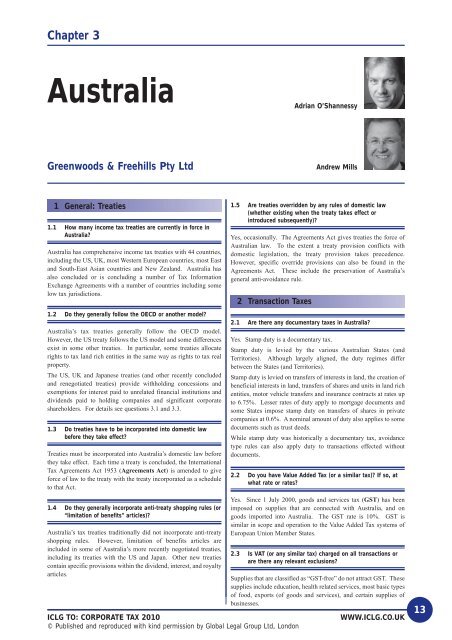Corporate Tax 2010 - BMR Advisors
Corporate Tax 2010 - BMR Advisors
Corporate Tax 2010 - BMR Advisors
You also want an ePaper? Increase the reach of your titles
YUMPU automatically turns print PDFs into web optimized ePapers that Google loves.
Chapter 3<br />
Australia<br />
Adrian O’Shannessy<br />
Greenwoods & Freehills Pty Ltd<br />
Andrew Mills<br />
1 General: Treaties<br />
1.1 How many income tax treaties are currently in force in<br />
Australia<br />
Australia has comprehensive income tax treaties with 44 countries,<br />
including the US, UK, most Western European countries, most East<br />
and South-East Asian countries and New Zealand. Australia has<br />
also concluded or is concluding a number of <strong>Tax</strong> Information<br />
Exchange Agreements with a number of countries including some<br />
low tax jurisdictions.<br />
1.2 Do they generally follow the OECD or another model<br />
Australia’s tax treaties generally follow the OECD model.<br />
However, the US treaty follows the US model and some differences<br />
exist in some other treaties. In particular, some treaties allocate<br />
rights to tax land rich entities in the same way as rights to tax real<br />
property.<br />
The US, UK and Japanese treaties (and other recently concluded<br />
and renegotiated treaties) provide withholding concessions and<br />
exemptions for interest paid to unrelated financial institutions and<br />
dividends paid to holding companies and significant corporate<br />
shareholders. For details see questions 3.1 and 3.3.<br />
1.3 Do treaties have to be incorporated into domestic law<br />
before they take effect<br />
Treaties must be incorporated into Australia’s domestic law before<br />
they take effect. Each time a treaty is concluded, the International<br />
<strong>Tax</strong> Agreements Act 1953 (Agreements Act) is amended to give<br />
force of law to the treaty with the treaty incorporated as a schedule<br />
to that Act.<br />
1.4 Do they generally incorporate anti-treaty shopping rules (or<br />
“limitation of benefits” articles)<br />
Australia’s tax treaties traditionally did not incorporate anti-treaty<br />
shopping rules. However, limitation of benefits articles are<br />
included in some of Australia’s more recently negotiated treaties,<br />
including its treaties with the US and Japan. Other new treaties<br />
contain specific provisions within the dividend, interest, and royalty<br />
articles.<br />
ICLG TO: CORPORATE TAX <strong>2010</strong><br />
© Published and reproduced with kind permission by Global Legal Group Ltd, London<br />
1.5 Are treaties overridden by any rules of domestic law<br />
(whether existing when the treaty takes effect or<br />
introduced subsequently)<br />
Yes, occasionally. The Agreements Act gives treaties the force of<br />
Australian law. To the extent a treaty provision conflicts with<br />
domestic legislation, the treaty provision takes precedence.<br />
However, specific override provisions can also be found in the<br />
Agreements Act. These include the preservation of Australia’s<br />
general anti-avoidance rule.<br />
2 Transaction <strong>Tax</strong>es<br />
2.1 Are there any documentary taxes in Australia<br />
Yes. Stamp duty is a documentary tax.<br />
Stamp duty is levied by the various Australian States (and<br />
Territories). Although largely aligned, the duty regimes differ<br />
between the States (and Territories).<br />
Stamp duty is levied on transfers of interests in land, the creation of<br />
beneficial interests in land, transfers of shares and units in land rich<br />
entities, motor vehicle transfers and insurance contracts at rates up<br />
to 6.75%. Lesser rates of duty apply to mortgage documents and<br />
some States impose stamp duty on transfers of shares in private<br />
companies at 0.6%. A nominal amount of duty also applies to some<br />
documents such as trust deeds.<br />
While stamp duty was historically a documentary tax, avoidance<br />
type rules can also apply duty to transactions effected without<br />
documents.<br />
2.2 Do you have Value Added <strong>Tax</strong> (or a similar tax) If so, at<br />
what rate or rates<br />
Yes. Since 1 July 2000, goods and services tax (GST) has been<br />
imposed on supplies that are connected with Australia, and on<br />
goods imported into Australia. The GST rate is 10%. GST is<br />
similar in scope and operation to the Value Added <strong>Tax</strong> systems of<br />
European Union Member States.<br />
2.3 Is VAT (or any similar tax) charged on all transactions or<br />
are there any relevant exclusions<br />
Supplies that are classified as “GST-free” do not attract GST. These<br />
supplies include education, health related services, most basic types<br />
of food, exports (of goods and services), and certain supplies of<br />
businesses.<br />
WWW.ICLG.CO.UK<br />
13
















